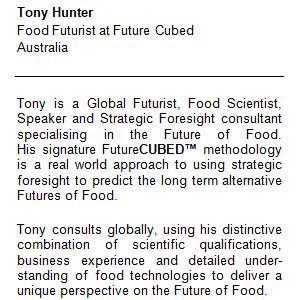
Marketplace Food
The Future Now Show
Books
Articles
Videos
Links
Voting
Members Dialogues
Live Events
Marketplaces
supported by ChatGPT
Please send your comments, ideas, contributions related to the Marketplace Food to
email ???
Global HUB Expert
Members:
Food is any substance consumed by living organisms to provide energy, sustain life, and support growth, repair, and overall health. It typically contains essential nutrients such as carbohydrates, proteins, fats, vitamins, and minerals that the body metabolizes to maintain its physiological functions.
the future of FoodThe future of food is shaped by global trends such as population growth, climate change, technological advancements, and shifting dietary preferences. Here’s an overview of key themes and innovations likely to influence food in the coming decades:
Sustainable AgriculturePrecision farming
Using AI, drones, and IoT to optimize crop yields, minimize waste, and reduce resource use.
Vertical farming
Growing food in controlled indoor environments to save space and resources.
Regenerative agriculture
Practices that restore soil health, increase biodiversity, and sequester carbon.Alternative Proteins
Plant-based proteins
Expanding offerings beyond soy and pea protein to include lentils, chickpeas, and other plant sources.
Lab-grown meat
Cultivated meat grown from animal cells without traditional farming.
Insect-based foods
Protein-rich options like cricket flour as sustainable alternatives.
Fermented proteins
Using fermentation to produce protein-rich, meat-like products.Food Technology Innovations3D-printed food
Customizable nutrition and design in meals, particularly for personalized diets or medical needs.
Synthetic biology
Engineering organisms to produce food ingredients (e.g., dairy proteins without cows).
Blockchain in supply chains
Enhancing traceability and transparency in food production and distribution.Climate-Resilient CropsDevelopment of crops that can withstand extreme weather, droughts, and pests, using genetic engineering or selective breeding.Functional Foods and Personalized Nutrition
Functional foods
Designed to provide health benefits beyond basic nutrition (e.g., gut-health-promoting probiotics).
Personalized nutrition
Diets tailored to individual genetics, microbiomes, and health goals, enabled by wearable devices and AI.Waste Reduction and Circular Food SystemsUpcycling food waste
Transforming by-products into edible products (e.g., turning spent grains into flour).
Edible packaging
Reducing plastic waste by using biodegradable or edible materials.
Food-sharing apps
Platforms to redistribute surplus food to reduce waste.Global Dietary ShiftsFlexitarian diets
Increased adoption of plant-heavy diets with occasional meat consumption.
Cultural fusion
Global cuisines influencing food trends and creating innovative dishes.Urban Food SystemsRooftop farms, community gardens, and urban aquaponics systems bringing food production closer to consumers.
Ethical and Transparent Food Practices
Consumers demanding fair-trade, organic, and cruelty-free products with clear labeling of origins and processes.
Challenges to Overcome
Affordability
Ensuring that innovations are accessible to all income levels.
Food security
Addressing inequalities in access to sufficient and nutritious food.
Public acceptance
Overcoming skepticism toward lab-grown or genetically modified foods.
The future of food will likely be a blend of high-tech innovation, sustainability practices, and cultural adaptation to meet the challenges of feeding a growing global population while preserving the planet.
Food Production globally
Global food production is a vast and complex system that varies significantly across regions due to differences in climate, geography, technology, and socioeconomic factors.
Key Crops and Their ProductionStaple crops
dominate global agriculture:Wheat, rice, and maize (corn)
Account for more than half of the world’s calorie intake.
Soybeans
Crucial for animal feed and plant-based protein products.
Other staples
Potatoes, cassava, barley, and millet in specific regions.Cash crops
Coffee, tea, sugar, cotton, and cocoa are grown primarily for export.Livestock and Aquaculture
Meat production
- Largest producers: The United States, Brazil, China, and the EU.
- Poultry is the fastest-growing meat sector due to its efficiency and lower cost.
Dairy production
Concentrated in countries like India, the US, and New Zealand.
Aquaculture
The fastest-growing food production sector, providing nearly half of all seafood globally.Food Production Regions
Asia
Largest producer of rice and seafood.
Rapidly growing aquaculture industry.
North America
Major producer of corn, soybeans, and beef.
Highly mechanized and industrialized farming systems.
South America
- Dominates global soybean and coffee production.
- Significant exporter of beef and poultry.
Africa
- Focused on smallholder farming.
- Increasing investment in cassava, maize, and millet.
Europe
- Known for high-value crops (e.g., wine, cheese).
- Stricter environmental and animal welfare standards.
Oceania
- Major exporters of dairy, beef, and lamb.
- Focused on extensive grazing systems.Challenges in Global Food Production
Climate Change
Affects crop yields, livestock health, and fisheries.
More frequent extreme weather events and shifting growing seasons.
Land and Water Scarcity
Arable land is finite, and water resources are overused in many regions.
Soil Degradation
Erosion, nutrient depletion, and salinization reduce productivity.
Food Waste
Approximately 30% of all food produced is wasted globally.
Pests and Diseases
Threaten crops and livestock, exacerbated by global trade and climate change.Emerging Trends in Food Production
Technology Integration
Precision agriculture using drones, sensors, and AI to optimize yields.
Vertical farming and hydroponics for urban food production.
Sustainable Practices
Regenerative agriculture to improve soil health and biodiversity.
Reduced reliance on chemical inputs like fertilizers and pesticides.
Genetically Modified Organisms (GMOs)
Used to increase yields and improve crop resilience, though controversial in some regions.
Alternative Protein Production
Lab-grown meat, plant-based proteins, and insect farming.Global Trade and Food Security
Global Trade
Food production is heavily reliant on international trade for staples like wheat, rice, and soybeans.
- Exporters: The US, Brazil, Canada, and the EU.
- Importers: China, the Middle East, and many African nations.
Food Security
Uneven distribution of food leads to hunger in some regions despite global surpluses.
Conflict, poverty, and economic instability exacerbate food insecurity.The Future of Global Food Production
Increased reliance on climate-resilient crops.
Expansion of renewable energy in farming operations.
A shift towards local food systems and reduced dependency on global supply chains.
Integration of circular economy principles to reduce waste.
Global food production is at a critical juncture, requiring innovation, cooperation, and sustainable practices to meet the growing demand of a rising population while addressing environmental and social challenges. Let me know if you'd like more details on any specific aspect!

The Future Now Show
Global Food
with Tony Hunter
Ensuring food companies can cope with exponentially changing food technologies to survive, profit and gain a competitive advantage. People are by nature linear but technology is exponential and we need to embrace exponential technologies. Tony is a Global Strategic Foresight consultant, Futurist, Food Scientist and Speaker specialising in alternative proteins and the Future of Food.
Credits
Tony Hunter
Food Futurist at Future Cubed, Australia
futuristforfood.comThe Future Now Show
Felix Bopp, Publisher
clubofamsterdam.com/the-future-now-show
top
BooksThese books address a range of topics, from the ethics of food production to the environmental impact of agriculture, offering diverse perspectives on the global food system. If you're looking for books about global food production, sustainability, and related topics, here’s a curated list of impactful and insightful works:
Global Food Systems and SustainabilityStuffed and Starved: The Hidden Battle for the World Food System
by Raj Patel
Explores the paradox of global food systems where millions face obesity while others suffer from hunger.
The Omnivore's Dilemma: A Natural History of Four Meals
by Michael Pollan
Examines the origins of food, focusing on industrial, organic, and foraged food systems.
In Defense of Food: An Eater's Manifesto
by Michael Pollan
A guide to healthier, more sustainable eating in the context of global food challenges.Climate Change and Agriculture
The Unsettling of America: Culture and Agriculture
by Wendell Berry
Critiques industrial agriculture and advocates for a return to small-scale, sustainable farming.
Farming While Black: Soul Fire Farm’s Practical Guide to Liberation on the Land
by Leah Penniman
Focuses on sustainable farming practices rooted in African diasporic traditions.
Diet for a Hot Planet: The Climate Crisis at the End of Your Fork and What You Can Do About It
by Anna Lappé
Connects food choices with climate change and offers solutions for a more sustainable future.Food Justice and Security
Big Hunger: The Unholy Alliance Between Corporate America and Anti-Hunger Groups
by Andrew Fisher
Investigates the role of corporate interests in perpetuating food insecurity.
We Are What We Eat: A Slow Food Manifesto
by Alice Waters
Advocates for local, sustainable food systems and the cultural value of cooking.
World Hunger: 10 Myths
by Frances Moore Lappé and Joseph Collins
Debunks common misconceptions about hunger and explores systemic solutions.Global Trade and Food Economics
Hungry City: How Food Shapes Our Lives
by Carolyn Steel
Explores the relationship between urban development and food systems.
The End of Food
by Paul Roberts
Analyzes the industrialization of food and its impacts on health, economics, and the environment.Food History and Cultural Perspectives
Salt: A World History
by Mark Kurlansky
A fascinating history of salt and its role in shaping economies and cultures.
The Third Plate: Field Notes on the Future of Food
by Dan Barber
Challenges traditional notions of farm-to-table dining and advocates for a holistic food system.Agricultural Innovation and Science
Tomatoland: How Modern Industrial Agriculture Destroyed Our Most Alluring Fruit
by Barry Estabrook
Investigates the environmental and human costs of modern tomato farming.
Foodtopia: Communities in Pursuit of Peace, Love, & Homegrown Food
by Margot Anne Kelley
Highlights innovative community-led solutions to global food challenges.
The Fate of Food: What We'll Eat in a Bigger, Hotter, Smarter World
by Amanda Little
Explores how technology and innovation are reshaping food production to address future challenges.
top
ArticlesFood Waste Index Report 2024
Food / Education / Climate Change
Soil / Education / Climate Change
FutureWater
Climate-Smart Agriculture
Philippines, Thailand and Singapore
with Anthony Bourdain
The science of water sustainability
by TechKnow, Al Jazeera English
Sustainable Water Future
Climate Change Success Story
Disposable eco-friendly packagingAlgae
Climate Change Success Story
Climate-Smart Agriculture
Climate Change Success Story
What more demand for meat means for the future
by Christophe Pelletier
Cooking on Biogas
by Gardenerd
Next Generation Fluid Filtration
by ECOFARIO
Food ArtHow To Grow Mushrooms in a Bucket
by GrowVeg
Mushrooms as medicine: Uncovering the health secrets of fungi
Merlin Sheldrake & Prof. Tim Spector
by ZOEReports provide valuable insights into the current state and future prospects of global food and farming systems, offering guidance for policymakers, researchers, and stakeholders involved in agriculture and food security.Leading global institutions regularly publish comprehensive reports on food and farming, addressing issues such as food security, agricultural development, and the impacts of climate change on agriculture. Here are some of the most influential reports:
Global Report on Food Crises (GRFC) 2024
by Food Security Information Network (FSIN), with contributions from organizations like the World Food Programme (WFP)
Focus
Analyzes acute food insecurity worldwide, highlighting regions and populations facing critical food shortages.
Key Findings
In 2023, nearly 282 million people in 59 countries/territories experienced high levels of acute food insecurity, underscoring the challenge of ending hunger by 2030.
The State of Food and Agriculture 2024
by Food and Agriculture Organization of the United Nations (FAO)
Focus
Provides an annual overview of emerging issues in agriculture, including agrifood systems and digital technologies in agriculture.
Key Insights
Emphasizes the importance of sustainable agricultural practices and the role of technology in enhancing food production.
Global Food Security Index 2022
by Economist Impact
Focus
Evaluates food security across 113 countries based on affordability, availability, quality, and safety.
Key Findings
Highlights the multidimensional nature of food security and the need for comprehensive policies to address various challenges.
2024 Global Food Policy Report
by International Food Policy Research Institute (IFPRI)
Focus
Reviews approaches across the food system to address desirability, affordability, accessibility, and other factors influencing food security.
Key Insights
Discusses policy recommendations to improve global food systems and address challenges such as climate change and economic disparities.
Agriculture and Food: Development News, Research, Data
by World Bank
Focus
Covers various aspects of agriculture and food systems, including food and nutrition security, climate-smart agriculture, and public policy.
Key Areas
Emphasizes building resilient food systems, supporting sustainable agricultural practices, and mobilizing capital for agrifood sectors.
top
VideosGlobal Food
with Tony Hunter
Food Strategies
with Christophe Pelletier
Climate Change / Food
Kirsten van Dam, Arjen Kamphuis, Hardy F. Schloer and Lise Voldeng
Regenerative Thinking
with Claudia Rodriguez Ortiz
ZOE
science-led health & nutrition content
top
Links
These institutions drive research, policy, and innovation to address global challenges in agriculture and food systems. Here’s a list of leading food and agriculture institutes globally, recognized for their research, innovation, and impact on the food and agriculture sectors:
International OrganizationsFood and Agriculture Organization (FAO)
Rome, Italy
Promotes global food security, sustainable agriculture, and rural development.
Notable Programs: Zero Hunger Initiative, Global Soil Partnership.
World Food Programme (WFP)
Rome, Italy
Provides food assistance in emergencies and supports food security and nutrition initiatives.
International Fund for Agricultural Development (IFAD)
Rome, Italy
Financing agricultural development projects in developing countries.
International Center for Agricultural Research in the Dry Areas (ICARDA)
Beirut, Lebanon
Research for resilient farming in dry areas, focusing on water, land, and crop systems.Research and Academic Institutes
International Rice Research Institute (IRRI)
Los Baños, Philippines
Research to improve rice production, reduce poverty, and ensure food security.
World Vegetable Center (AVRDC)
Tainan, Taiwan
Research and development for vegetable crops to enhance nutrition and incomes.
CIMMYT (International Maize and Wheat Improvement Center)
Texcoco, Mexico
Developing improved maize and wheat varieties for food security.
CGIAR (Consultative Group on International Agricultural Research)
Montpellier, France
Global network of research centers addressing agriculture, food security, and climate resilience.National Agricultural Institutes
US Department of Agriculture (USDA)
Washington, D.C., USA
Policy, research, and development for US agriculture and food systems.
Indian Council of Agricultural Research (ICAR)
New Delhi, India
Agricultural research, education, and innovation in India.
Chinese Academy of Agricultural Sciences (CAAS)
Beijing, China
Research on crop sciences, biotechnology, and sustainable farming in China.
Australian Centre for International Agricultural Research (ACIAR)
Canberra, Australia
Partnerships to improve agriculture in developing countries.Specialized Institutes
International Livestock Research Institute (ILRI)
Nairobi, Kenya
Livestock systems research to improve livelihoods and nutrition in developing countries.
International Water Management Institute (IWMI)
Colombo, Sri Lanka
Sustainable water use in agriculture and climate resilience.
Center for International Forestry Research (CIFOR)
Bogor, Indonesia
Forests, landscapes, and their role in sustainable agriculture.Nonprofits and Think Tanks
The World Resources Institute (WRI)
Washington, D.C., USA
Sustainable land and water use, climate-smart agriculture.
The Rockefeller Foundation – Food Initiative
New York, USA
Transforming food systems for equity and sustainability.
The EAT Foundation
Oslo, Norway
Global food systems transformation for health and sustainability.Private Sector-Led Initiatives
Syngenta Foundation for Sustainable Agriculture
Basel, Switzerland
Smallholder farmer development and innovation.
Bill & Melinda Gates Foundation – Agricultural Development Program
Seattle, USA
Supporting smallholder farmers in Africa and Asia with innovative farming practices.
Companies that play pivotal roles in shaping global food and agriculture systems through innovation, supply chain management, and policy influence. Here’s a list of leading global food and agricultural companies, categorized by their focus areas:
Agricultural Input and Seed Companies
These companies provide seeds, fertilizers, pesticides, and related products for farming.Bayer AG (Crop Science Division)
Leverkusen, Germany
Seeds, crop protection products, and digital farming solutions.
Corteva Agriscience
Wilmington, Delaware, USA
Seeds, crop protection chemicals, and agritech.
Syngenta Group
Basel, Switzerland
Seeds, crop protection, and digital solutions for sustainable agriculture.
BASF Agricultural Solutions
Ludwigshafen, Germany
Crop protection, seeds, and biological solutions.
Nutrien Ltd.
Saskatoon, Canada
Fertilizers, crop inputs, and agricultural services.Food Processing and Distribution Giants
These companies process and distribute food on a global scale.Nestlé
Vevey, Switzerland
Packaged foods, beverages, and infant nutrition.
Cargill
Wayzata, Minnesota, USA
Food ingredients, animal feed, and agricultural commodities.
Archer Daniels Midland (ADM)
Chicago, Illinois, USA
Agricultural processing, food ingredients, and bioenergy.
Tyson Foods
Springdale, Arkansas, USA
Meat processing, poultry, and prepared foods.
JBS S.A.
São Paulo, Brazil
Meat processing, including beef, poultry, and pork.Grain Trading and Commodities
These companies trade grains, oilseeds, and other agricultural commodities.Bunge Limited
Chesterfield, Missouri, USA
Grain trading, oilseed processing, and food ingredients.
Louis Dreyfus Company (LDC)
Rotterdam, Netherlands
Global trading of grains, sugar, coffee, and oilseeds.
Olam Group
Singapore
Agricultural commodities, including nuts, cocoa, coffee, and grains.Dairy and Beverage Companies
Focused on milk, dairy products, and beverages.Danone
Paris, France
Dairy products, plant-based beverages, and baby nutrition.
Fonterra Co-operative Group
Auckland, New Zealand
Dairy production and global exports.
Coca-Cola Company
Atlanta, Georgia, USA
Beverages, including juices, sodas, and water.Agricultural Machinery Companies
Manufacture equipment and machinery for farming.John Deere (Deere & Company)
Moline, Illinois, USA
Tractors, harvesters, and precision farming technologies.
CNH Industrial (Case IH and New Holland)
London, UK
Agricultural machinery, construction equipment, and precision farming.
AGCO Corporation
Duluth, Georgia, USA
Tractors, sprayers, and grain storage equipment.Emerging AgTech Companies
Focused on innovation, sustainability, and digital agriculture.Indigo Agriculture
Boston, Massachusetts, USA
Microbial seed treatments, soil health, and carbon credits.
Farmers Edge
Winnipeg, Canada
Precision agriculture and farm data management.
CropX Technologies
Israel
Soil health monitoring and irrigation solutions.Global Retailers and Consumer-Focused Companies
These companies have significant influence on food systems through their supply chains.Walmart
Bentonville, Arkansas, USA
Retailing fresh and packaged foods globally.
Costco Wholesale
Issaquah, Washington, USA
Bulk food sales and private-label organic products.
Unilever
London, UK, and Rotterdam, Netherlands
Packaged foods, condiments, and beverages.
top
Voting
top
Members Dialogues
top

Live Events
Copyright © 2002-2025, Felix Bopp. All rights reserved.











